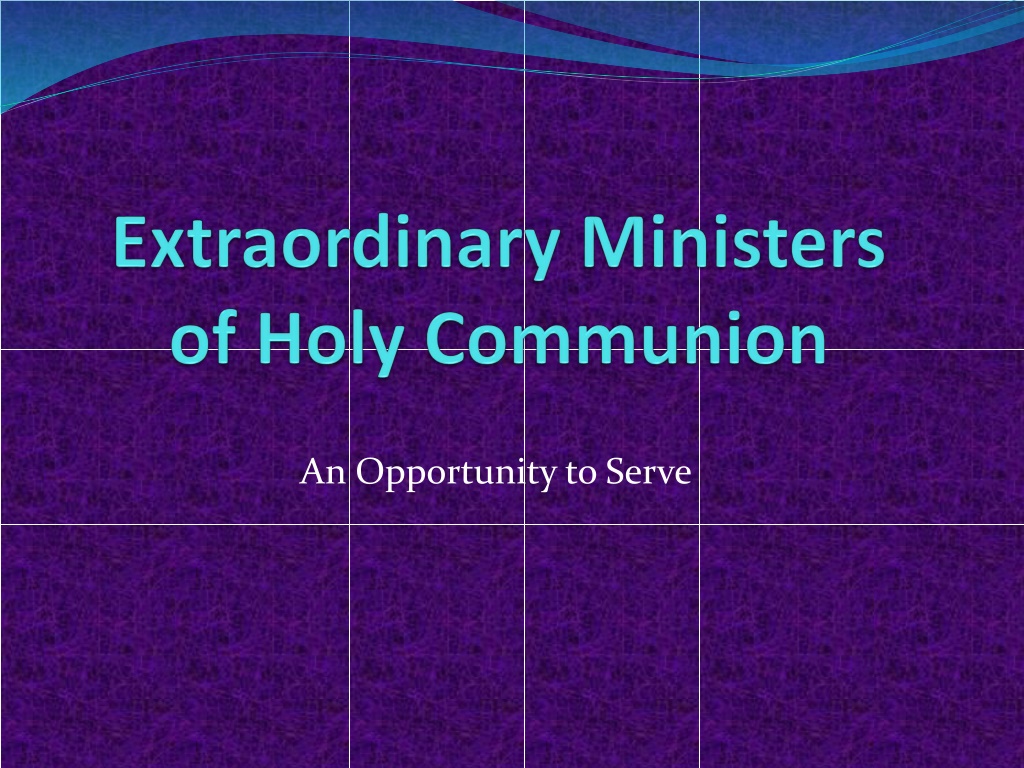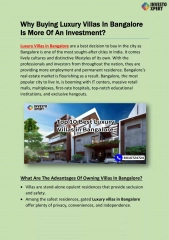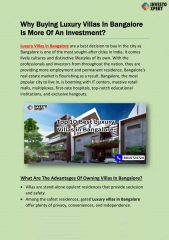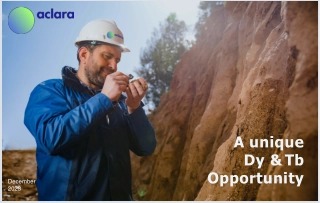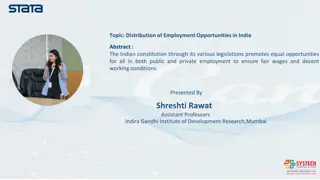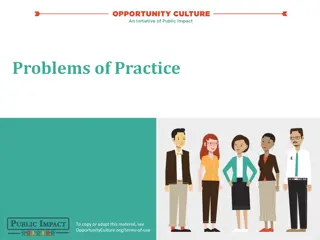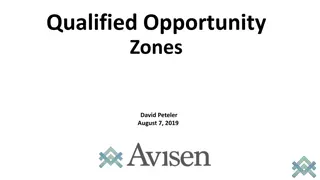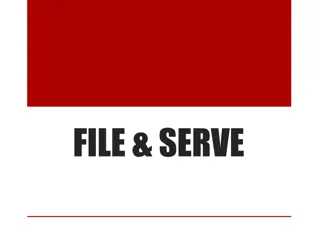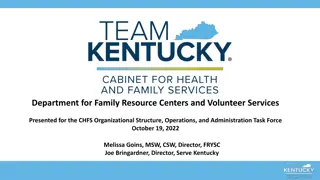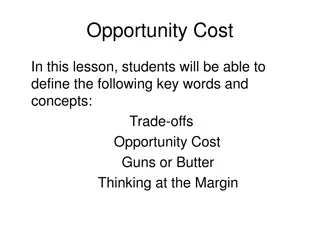An Opportunity to Serve
Norms, qualifications, and training required for individuals serving as Extraordinary Ministers of Holy Communion. Learn about the spiritual, theological, and practical aspects involved in this important ministry, as well as the commissioning process overseen by the pastor.
Download Presentation

Please find below an Image/Link to download the presentation.
The content on the website is provided AS IS for your information and personal use only. It may not be sold, licensed, or shared on other websites without obtaining consent from the author.If you encounter any issues during the download, it is possible that the publisher has removed the file from their server.
You are allowed to download the files provided on this website for personal or commercial use, subject to the condition that they are used lawfully. All files are the property of their respective owners.
The content on the website is provided AS IS for your information and personal use only. It may not be sold, licensed, or shared on other websites without obtaining consent from the author.
E N D
Presentation Transcript
Norms for Extraordinary Ministers of Holy Communion Why the emphasis on the name? There was a custom to call people Eucharistic Ministers . Language does mean something, technically the minister (the one who does something) of the Eucharist is the priest. The language is an attempt to be more precise. Henri de Lubac, named cardinal late in life, wrote a book, The Splendor of the Church . He wrote it early in his life while under censure from the Church. (I believe the censure was an attempt to save his life from the Nazi s) . He makes a beautiful distinction between the internal and external manifestation of the priesthood. We are all priests by baptism, the ordained minister is called to express this more externally while the laity more internally.
Why Extraordinary This word implies an exception, or an extraordinary measure in unusual circumstances. The purpose is driven out of practical necessity, ordinary ministers of Holy Communion are the priest and deacon. Installed acolytes are usually seminarians, and they are commissioned universally to be extraordinary ministers of Holy Communion.
Qualifications and Training Men and Women of High School age or Older who have received the Sacrament of Confirmation Demonstrate knowledge of the Holy Mass, sacred vessels, proper procedures, etc. Demonstrate a mature spirituality, and be of sound doctrine and exemplary moral life. Catholics who do not live worthy lives or who do not enjoy good reputations or whose family situations do not conform to the teaching of the Church may not be admitted to the exercise of functions such as the extraordinary minister of Holy Communion.6 Undergo formal training to become an extraordinary minister of Holy Communion
Spiritual, Theological and Practical Training 1. A study of the Church s teachings on the Holy Eucharist, as found in Sacred Scripture, the Catechism of the Catholic Church, and other sources approved by the pastor. 2. An overview of the spiritual life, devotions, and reverence that foster the fruitful discharging of a function so closely tied to the Holy Eucharist. 3. Detailed liturgical practicum sessions for the proper distribution of the Sacred Body and Precious Blood of Christ at Mass. 4. Reception and review of these diocesan norms.
Commissioning of Ministers The Pastor commissions and oversees the ministers Each Parish is to maintain a list of current ministers. All EMHC are encouraged to attend a retreat or day of recollection at least once a year. All EMHC are to possess a copy of the Diocesan Norms All ministers are to be commissioned in accord with the rite found in the book of Blessings Chapter 63 Anyone commissioned by any pastor may serve in another parish with the permission of the proper pastor The Pastor for unforeseen reasons, may give a one time deputation as found in Appendix III of the Roman Missal
Proper Preparations and Procedures Reverence and Decorum All EMHC are to show the greatest reverence for the sacred species. Care should be taken to never refer to the consecrated elements as bread or wine . The locations are not to be referred to as Bread stations or wine stations The sacred vessels should not be referred to as bowls or cups, but rather ciborium or chalice.
Sacred Vessels The vessels are to be held in special honor., the ciborium and chalices should always be placed on top of a corporal, not just set anywhere on the credence table or altar, a corporal should always be underneath the sacred vessel. In the United States, ciborium are permitted to be made of quality materials but they should still be practically unbreakable and non-porous. The Precious Blood is never to be consecrated in a flagon, or pitcher.
Assigning EMHC for Masses This should be scheduled, and the ministers are encouraged to check in before mass to confirm the need at the particular Mass Some parishes have a board with removable markers to denote how many ministers are needed at the Mass. If there are other priests or deacons, or a formally installed acolyte present, they would take precedence over the EMHC.
Approaching the Altar The EMHC are not to enter the sanctuary until after the Priest has consumed both species of the Eucharist. They may approach the area during the Lamb of God, but should not ascend the steps until after the priest has consumed both species. Hand Sanitizer should be used for hygienic reasons and applied outside the sanctuary. This is located just behind the altar on the other side of the wall down the hallways to the back sacristy The Priest distributes the Host to the servers and the extraordinary ministers of Holy Communion, and then gives the Precious Blood to the ministers who can then give the Precious Blood to assisting ministers.
Distribution of the Host The EMHC says, The Body of Christ : never should one use personal names, e.g. ( John, The Body of Christ ) The Body of Christ, is realized perfectly in the Host, and imperfectly both in the minister and the recipient. It is also a gift to be received and never, never taken . One should try and avoid touching the tongue of the recipient and one is not obliged to touch the hand when distributing the host. After communion one should see if any fragments may be adhering to one s fingers and should purify their fingers in the ablution cup found on the credence table. Due diligence must be observed in being certain that the host is consumed, if necessary follow the person if the host is not consumed.
Distribution of the Precious Blood One simply says, The Blood of Christ Christ is fully present under both species, so sometimes it is possible if someone has a severe allergy to gluten, they may just approach the chalice minister, which is totally appropriate After each person receives the Precious Blood the purificator is to be used to wipe the chalice, then slightly rotate the chalice for the next communicant.
Signs of Reverence The faithful are to bow their heads before the reception of the Eucharist, so remember this when the host is distributed to you. All people have the right to receive Communion either standing or kneeling, standing is the accepted custom in the US, but we are called to respect individual s preferences.
Blessings During Holy Communion The Liturgy is a Public Act of Worship, and only the priest is to publically bless in such circumstances. The custom has arisen where many people approach the altar for a blessing, people are encouraged to seek a spiritual communion if they cannot physically receive, however it is permitted for the EMHC to say, May God Bless You , or May the peace of Christ be with you , or Receive Jesus in your Heart. It must not be accompanied by any gesture of the sign of the Cross or even touching the person.
Problems or Mishaps Again due diligence must be exercised in assuring the consumption of the host, be very attentive to this. If the host should fall to the ground, pick it up and see if any fragments are visible, the host is then to be dissolved totally in water and put down the sacrarium (the covered sink in the sacristy) after mass. Intact hosts should never be buried in the ground. If there should be a spill of the precious blood the area should be washed with water and then again the cloths for cleaning should be rinsed in the sacrarium.
After Communion Purification is to be done by the priest, deacon or officially installed acolyte. The Remaining Precious Blood is never to be poured down the sacrarium. Ministers are permitted in the diocese to consume any remaining Precious Blood in their respective chalices near the altar. Immediately after mass the purificators are to be place in a bowl of water found in the sacrarium, then they will be later laundered per the guidelines.
Ministers to the Homebound Ministers taking communion to shut-ins should bring their pyx before Mass and indicate the number of hosts needed. After communion, but before the Prayer after Communion, the priest will give the pyx to the respective ministers and inform the community that they will take communion to those unable to be present at Mass. The EMHC are to follow the prescribed guidelines for distributing Holy Communion found in chapter 3 of the Pastoral Care of the Sick In danger of death, EMHC are permitted to pray the Viaticum prayers found in Chapter 5 of the Pastoral Care to the Sick
In the Absence of a Priest If a priest is unavailable, the EMHC are permitted to expose and repose the Eucharist for Adoration, but may not use incense or do Benediction.
